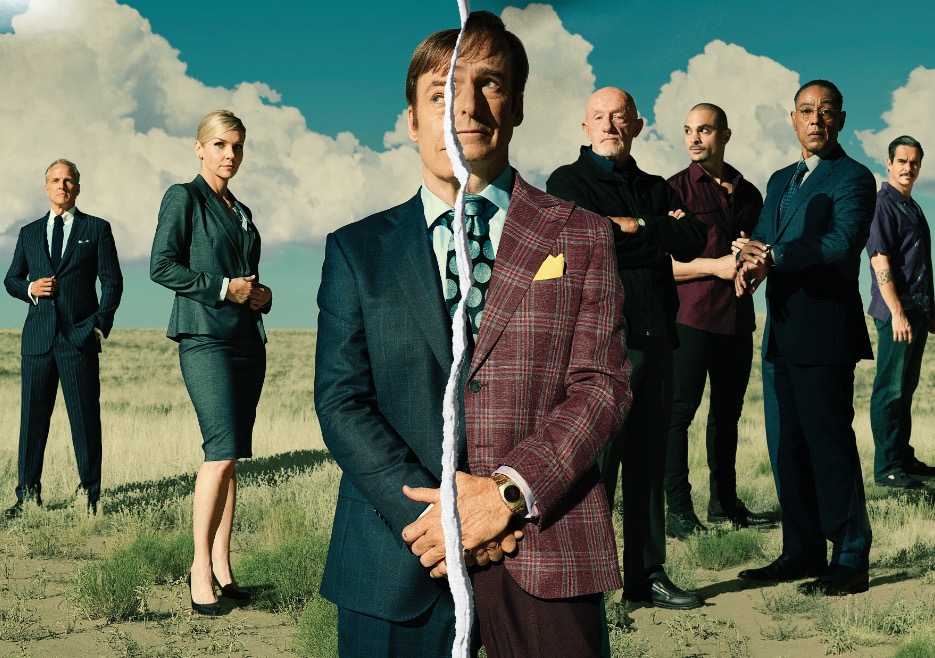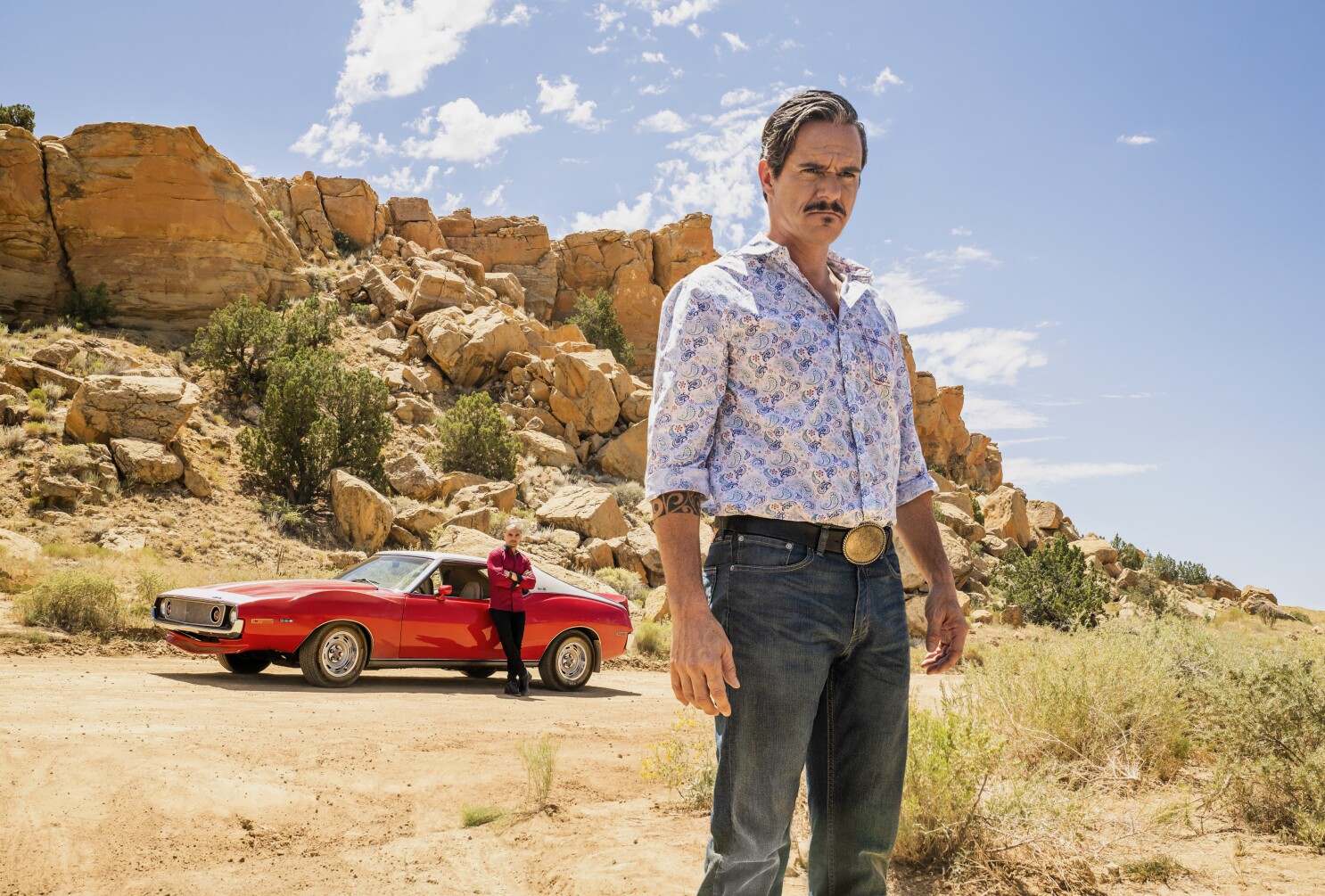No Spoilers - Read Away!
This show has just gotten better and better.
The fifth season of the Breaking Bad prequel series continues to tell the backstory of Saul Goodman, the professional name finally, officially adopted by hustling lawyer James McGill.
Yes, it's become as much a "Breaking Bad, season 0.5" as it has been the back story of Saul Goodman, but one can't deny just how expertly crafted it all is and how it does still manage to keep clearing the incredibly high bar that its creators have set for themselves.
At the end of season 4, Jimmy (Bob Odenkirk) had reckoned with the loss of his brother, Chuck, though he narrowly managed to avoid completely losing his law license. Instead, he waits out his suspension, cons the bar into restoring his license, and he officially decides to practice law as "Saul Goodman." Season five picks up immediately after those events, with Jimmy's legal license suspended and Kim (Rhea Seahorn) trying to make her name working for a huge-name bank. Meanwhile, the illegal drug trade grows ever-more tense, with Gustavo Fring methodically attempting to build a power base from which to eventually strike back at his bosses in Mexico (a story which we saw play out in later seasons of Breaking Bad). Assisting Fring is Mike, who still remains stoic while continuing his secret life as a security expert and enforcer for the his ruthless boss. The main thorn in Fring's and Mike's side is Lalo Salamanca, the oddly cheery and lethally cunning emissary looking over the New Mexico drug scene for his family. Stuck in the middle of those large-scale shady dealing is Ignacio "Nacho" Varga, the mid-level street guy who is looking for a way out of the drug trade altogether.
This season is arguably the best yet, even if it's not quite as purely about Jimmy/Saul as the first few of seasons. Not only do we get to see Saul becoming far more like the sleazy lawyer we met in Breaking Bad, but every character interaction and dramatic beat seems firmly in place. Arguably even more than the best seasons of Breaking Bad, this show is about as tight as they come. In contrast to that brilliant show, though, Better Call Saul exhibits unbelievable patience in its execution and storytelling. It probably helps that most of us viewers know, thanks to Breaking Bad and the previous four seasons of Saul, that patience is rewarded. Scenes that may be puzzling in the moment always make sense later on. Or at the very least, they offer viewers the opportunity to put pieces together in engaging ways. It's just a blast to watch, on many levels.
It's been announced that the next season - to be released in 2021 - will indeed be the final one. This is as it should be, as we see the nearly-finished "Saul Goodman" at this point. And even though we know certain things about where some of these characters will be at season's end, there's still plenty we don't know. Regardless of whose story you tune in to catch, I have every confidence that this show will end in the same high-quality fashion that its root show did. It should be a great final ride.
This show has just gotten better and better.
The fifth season of the Breaking Bad prequel series continues to tell the backstory of Saul Goodman, the professional name finally, officially adopted by hustling lawyer James McGill.
Yes, it's become as much a "Breaking Bad, season 0.5" as it has been the back story of Saul Goodman, but one can't deny just how expertly crafted it all is and how it does still manage to keep clearing the incredibly high bar that its creators have set for themselves.
At the end of season 4, Jimmy (Bob Odenkirk) had reckoned with the loss of his brother, Chuck, though he narrowly managed to avoid completely losing his law license. Instead, he waits out his suspension, cons the bar into restoring his license, and he officially decides to practice law as "Saul Goodman." Season five picks up immediately after those events, with Jimmy's legal license suspended and Kim (Rhea Seahorn) trying to make her name working for a huge-name bank. Meanwhile, the illegal drug trade grows ever-more tense, with Gustavo Fring methodically attempting to build a power base from which to eventually strike back at his bosses in Mexico (a story which we saw play out in later seasons of Breaking Bad). Assisting Fring is Mike, who still remains stoic while continuing his secret life as a security expert and enforcer for the his ruthless boss. The main thorn in Fring's and Mike's side is Lalo Salamanca, the oddly cheery and lethally cunning emissary looking over the New Mexico drug scene for his family. Stuck in the middle of those large-scale shady dealing is Ignacio "Nacho" Varga, the mid-level street guy who is looking for a way out of the drug trade altogether.
This season is arguably the best yet, even if it's not quite as purely about Jimmy/Saul as the first few of seasons. Not only do we get to see Saul becoming far more like the sleazy lawyer we met in Breaking Bad, but every character interaction and dramatic beat seems firmly in place. Arguably even more than the best seasons of Breaking Bad, this show is about as tight as they come. In contrast to that brilliant show, though, Better Call Saul exhibits unbelievable patience in its execution and storytelling. It probably helps that most of us viewers know, thanks to Breaking Bad and the previous four seasons of Saul, that patience is rewarded. Scenes that may be puzzling in the moment always make sense later on. Or at the very least, they offer viewers the opportunity to put pieces together in engaging ways. It's just a blast to watch, on many levels.
It's been announced that the next season - to be released in 2021 - will indeed be the final one. This is as it should be, as we see the nearly-finished "Saul Goodman" at this point. And even though we know certain things about where some of these characters will be at season's end, there's still plenty we don't know. Regardless of whose story you tune in to catch, I have every confidence that this show will end in the same high-quality fashion that its root show did. It should be a great final ride.


